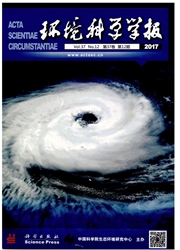

 中文摘要:
中文摘要:
采用新鲜校园餐厨垃圾进行蚯蚓堆肥的实验室模拟,分析了餐厨垃圾与基质土配比、培养温度、蚯蚓接种密度对堆肥过程中蚯蚓生长繁殖的影响,堆肥试验为期6周.定期观察和记录蚯蚓的体重和幼虫数量,计算其日增重倍数和日繁殖倍数.研究结果表明,新鲜餐厨垃圾与土壤质量比为1∶4,接种密度为每500g新鲜餐厨垃圾与土壤的混合基质中投加15条个体体重为400-600mg的赤子爱胜蚓,在培养温度为25℃条件下进行餐厨垃圾堆肥,赤子爱胜蚓的生长和繁殖状况最佳,其也是新鲜餐厨垃圾蚯蚓堆肥的最佳条件.
 英文摘要:
英文摘要:
The laboratory experiment was conducted to stimulate the vermicomposting of fresh campus kitchen waste by Eiseniafoetida.Effects of the ratio of fresh kitchen waste to soil substrate,culture temperature,and earthworm inoculating density were analyzed on the growth and reproduction of the earthworm during the 6-week vermicomposting of the campus kitchen waste.The earthworm weigh and the youth worm number were recorded by the routine observation,and the daily weight gain and breeding ratio of earthworm were calculated.Results showed that the ratio of fresh kitchen waste to substrate soil is 1∶4,the inoculating density 15 mature earthworms with initial weight of 400 - 600 mg into 500 substrate,and the temperature 25 ℃ were the optimum vermicomposting condition.
 同期刊论文项目
同期刊论文项目
 同项目期刊论文
同项目期刊论文
 期刊信息
期刊信息
